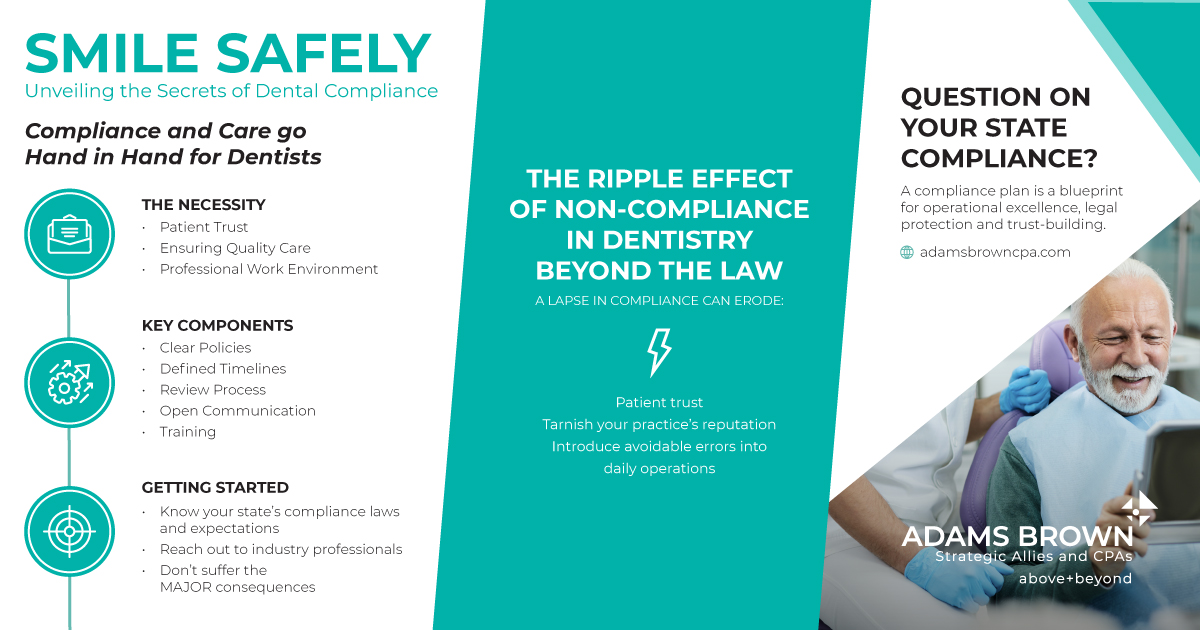Stay Compliant: Best Practices for Dental Professionals
Compliance and Care Go Hand in Hand for Dentists
Let’s face it – being a dentist isn’t just about filling cavities and recommending the right toothpaste. Behind the scenes, there’s a whirlwind of processes to make sure you are doing right by your patients and your team. Amid all the challenges, have you ever paused and thought about the importance of a compliance plan for your dental practice? A well-structured compliance plan can help your dental practice avoid legal issues, build patient trust and create a professional work environment.
What is a Compliance Plan?
A compliance plan keeps me out of hot water, right? Yes, a well-built compliance plan that is successfully implemented will certainly help ensure your practice stays out of hot water. By identifying the set(s) of guidelines and best practices, developing specific timelines to accomplish tasks and a defined review process, you can have more piece of mind that required items have not fallen through the cracks.
However, a well-designed compliance plan can go one step further by encouraging employee communication and early intervention on any noted areas of concern. A successful compliance plan is a fundamental part of a business’s compliance culture. With a tone-at-the-top culture, and leadership buy-in, implementing a compliance plan can be a great tool to help employees feel good about the practice they are a part of. Employees can become one of your business’s biggest assets to help protect your brand from scandal and lawsuits.
The Necessity of a Compliance Plan in a Dental Practice
- Patient Trust: Patients entrust dental professionals with their health. By having clear compliance measures, you signal to your patients that their well-being is a priority.
- Ensuring Quality Care: By adhering to guidelines and best practices, your dental practice can consistently provide top-tier care, free from avoidable mistakes or oversights.
- Professional Work Environment: Compliance plans often translate into standardized processes and protocols, fostering a harmonious and professional atmosphere for your team.
Key Components of a Compliance Plan
- Clear Policies: Establish and communicate policies that guide daily operations.
- Defined Timelines: Set specific timelines to complete compliance-related tasks.
- Review Process: Regularly review and refine the plan to accommodate laws or best practices changes.
- Encourage Open Communication: Empower employees to voice concerns or highlight potential areas of non-compliance.
- Training: Periodically educate your team on compliance measures to ensure everyone is on the same page.
Getting Started on Your Plan
Start by brushing up on dental industry guidelines. If you are scratching your head at any point, do not hesitate to reach out to industry peers or professionals. Your team is also a treasure trove of insights – involve them. Once you have your plan, make it easy for everyone to find and reference.
Consequences of Non-Compliance
Non-compliance is not just about potential legal ramifications, although those can be substantial. A lapse in compliance can erode patient trust, tarnish your practice’s reputation and introduce avoidable errors into daily operations. It’s a risk.
A compliance plan isn’t just a checkbox on a to-do list. For dental practices, it’s a blueprint for operational excellence, legal protection and trust-building. If you need more clarification about your practice’s current state of compliance, now’s the time to take action. Contact an Adams Brown Dental advisory team member to discuss your compliance plan.



